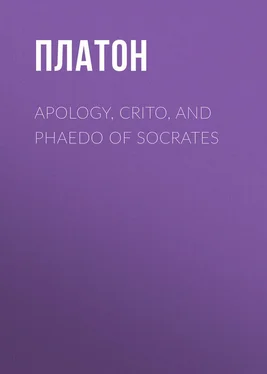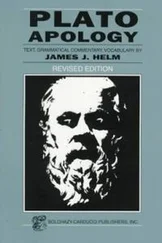Платон - Apology, Crito, and Phaedo of Socrates
Здесь есть возможность читать онлайн «Платон - Apology, Crito, and Phaedo of Socrates» — ознакомительный отрывок электронной книги совершенно бесплатно, а после прочтения отрывка купить полную версию. В некоторых случаях можно слушать аудио, скачать через торрент в формате fb2 и присутствует краткое содержание. Жанр: Философия, foreign_antique, foreign_prose, на английском языке. Описание произведения, (предисловие) а так же отзывы посетителей доступны на портале библиотеки ЛибКат.
- Название:Apology, Crito, and Phaedo of Socrates
- Автор:
- Жанр:
- Год:неизвестен
- ISBN:нет данных
- Рейтинг книги:4 / 5. Голосов: 1
-
Избранное:Добавить в избранное
- Отзывы:
-
Ваша оценка:
- 80
- 1
- 2
- 3
- 4
- 5
Apology, Crito, and Phaedo of Socrates: краткое содержание, описание и аннотация
Предлагаем к чтению аннотацию, описание, краткое содержание или предисловие (зависит от того, что написал сам автор книги «Apology, Crito, and Phaedo of Socrates»). Если вы не нашли необходимую информацию о книге — напишите в комментариях, мы постараемся отыскать её.
Apology, Crito, and Phaedo of Socrates — читать онлайн ознакомительный отрывок
Ниже представлен текст книги, разбитый по страницам. Система сохранения места последней прочитанной страницы, позволяет с удобством читать онлайн бесплатно книгу «Apology, Crito, and Phaedo of Socrates», без необходимости каждый раз заново искать на чём Вы остановились. Поставьте закладку, и сможете в любой момент перейти на страницу, на которой закончили чтение.
Интервал:
Закладка:
Mel. There is not.
Socr. How obliging you are in having hardly answered; though compelled by these judges! You assert, then, that I do believe and teach things relating to demons, whether they be new or old; therefore, according to your admission, I do believe in things relating to demons, and this you have sworn in the bill of indictment. If, then, I believe in things relating to demons, there is surely an absolute necessity that I should believe that there are demons. Is it not so? It is. For I suppose you to assent, since you do not answer. But with respect to demons, do we not allow that they are gods, or the children of gods? Do you admit this or not?
Mel. Certainly.
Socr. Since, then, I allow that there are demons, as you admit, if demons are a kind of gods, this is the point in which I say you speak enigmatically and divert yourself in saying that I do not allow there are gods, and again that I do allow there are, since I allow that there are demons? But if demons are the children of gods, spurious ones, either from nymphs or any others, of whom they are reported to be, what man can think that there are sons of gods, and yet that there are not gods? For it would be just as absurd as if any one should think that there are mules, the offspring of horses and asses, but should not think there are horses and asses. However, Melitus, it can not be otherwise than that you have preferred this indictment for the purpose of trying me, or because you were at a loss what real crime to allege against me; for that you should persuade any man who has the smallest degree of sense that the same person can think that there are things relating to demons and to gods, and yet that there are neither demons, nor gods, not heroes, is utterly impossible.
16. That I am not guilty, then, O Athenians! according to the indictment of Melitus, appears to me not to require a lengthened defense; but what I have said is sufficient. And as to what I said at the beginning, that there is a great enmity toward me among the multitude, be assured it is true. And this it is which will condemn me, if I am condemned, not Melitus, nor Anytus, but the calumny and envy of the multitude, which have already condemned many others, and those good men, and will, I think, condemn others also; for there is no danger that it will stop with me.
Perhaps, however, some one may say, "Are you not ashamed, Socrates, to have pursued a study from which you are now in danger of dying?" To such a person I should answer with good reason, You do not say well, friend, if you think that a man, who is even of the least value, ought to take into the account the risk of life or death, and ought not to consider that alone when be performs any action, whether he is acting justly or unjustly, and the part of a good man or bad man. For, according to your reasoning, all those demi-gods that died at Troy would be vile characters, as well all the rest as the son of Thetis, who so far despised danger in comparison of submitting to disgrace, that when his mother, who was a goddess, spoke to him, in his impatience to kill Hector, something to this effect, as I think, 2 2 "Iliad," lib. xviii. ver. 94, etc.
"My son, if you revenge the death of your friend Patroclus, and slay Hector, you will yourself die, for," she said, "death awaits you immediately after Hector;" but he, on hearing this, despised death and danger, and dreading much more to live as a coward, and not avenge his friend, said, "May I die immediately when I have inflicted punishment on the guilty, that I may not stay here an object of ridicule, by the curved ships, a burden to the ground?" – do you think that he cared for death and danger? For thus it is, O Athenians! in truth: wherever any one has posted himself, either thinking it to be better, or has been posted by his chief, there, as it appears to me, he ought to remain and meet danger, taking no account either of death or anything else in comparison with disgrace.
17. I then should be acting strangely, O Athenians! if, when the generals whom you chose to command me assigned me my post at Potidæa, at Amphipolis, and at Delium, I then remained where they posted me, like any other person, and encountered the danger of death; but when the deity, as I thought and believed, assigned it as my duty to pass my life in the study of philosophy, and examining myself and others, I should on that occasion, through fear of death or any thing else whatsoever, desert my post, strange indeed would it be; and then, in truth, any one might justly bring me to trial, and accuse me of not believing in the gods, from disobeying the oracle, fearing death, and thinking myself to be wise when I am not. For to fear death, O Athenians! is nothing else than to appear to be wise, without being so; for it is to appear to know what one does not know. For no one knows but that death is the greatest of all good to man; but men fear it, as if they well knew that it is the greatest of evils. And how is not this the most reprehensible ignorance, to think that one knows what one does not know? But I, O Athenians! in this, perhaps, differ from most men; and if I should say that I am in any thing wiser than another, it would be in this, that not having a competent knowledge of the things in Hades, I also think that I have not such knowledge. But to act unjustly, and to disobey my superior, whether God or man, I know is evil and base. I shall never, therefore, fear or shun things which, for aught I know, maybe good, before evils which I know to be evils. So that, even if you should now dismiss me, not yielding to the instances of Anytus, who said that either I should not 3 3 See the "Crito," sec. 5 .
appear here at all, or that, if I did appear, it was impossible not to put me to death, telling you that if I escaped, your sons, studying what Socrates teaches, would all be utterly corrupted; if you should address me thus, "Socrates, we shall not now yield to Anytus, but dismiss you, on this condition, however, that you no longer persevere in your researches nor study philosophy; and if hereafter you are detected in so doing, you shall die" – if, as I said, you should dismiss, me on these terms, I should say to you, "O Athenians! I honor and love you; but I shall obey God rather than you; and so long as I breathe and am able, I shall not cease studying philosophy, and exhorting you and warning any one of you I may happen to meet, saying, as I have been accustomed to do: 'O best of men! seeing you are an Athenian, of a city the most powerful and most renowned for wisdom and strength, are you not ashamed of being careful for riches, how you may acquire them in greatest abundance, and for glory, and honor, but care not nor take any thought for wisdom and truth, and for your soul, how it maybe made most perfect?'" And if any one of you should question my assertion, and affirm that he does care for these things, I shall not at once let him go, nor depart, but I shall question him, sift and prove him. And if he should appear to me not to possess virtue, but to pretend that he does, I shall reproach him for that he sets the least value on things of the greatest worth, but the highest on things that are worthless. Thus I shall act to all whom I meet, both young and old, stranger and citizen, but rather to you, my fellow-citizens, because ye are more nearly allied to me. For be well assured, this the deity commands. And I think that no greater good has ever befallen you in the city than my zeal for the service of the god. For I go about doing nothing else than persuading you, both young and old, to take no care either for the body, or for riches, prior to or so much as for the soul, how it may be made most perfect, telling you that virtue does not spring from riches, but riches and all other human blessings, both private and public, from virtue. If, then, by saying these things, I corrupt the youth, these things must be mischievous; but if any one says that I speak other things than these, he misleads you. 4 4 Ουδεν λεγει , literally, "he says nothing: " on se trompe, ou l'on vous impose , Cousin .
Therefore I must say, O Athenians! either yield to Anytus, or do not, either dismiss me or not, since I shall not act otherwise, even though I must die many deaths.
Интервал:
Закладка:
Похожие книги на «Apology, Crito, and Phaedo of Socrates»
Представляем Вашему вниманию похожие книги на «Apology, Crito, and Phaedo of Socrates» списком для выбора. Мы отобрали схожую по названию и смыслу литературу в надежде предоставить читателям больше вариантов отыскать новые, интересные, ещё непрочитанные произведения.
Обсуждение, отзывы о книге «Apology, Crito, and Phaedo of Socrates» и просто собственные мнения читателей. Оставьте ваши комментарии, напишите, что Вы думаете о произведении, его смысле или главных героях. Укажите что конкретно понравилось, а что нет, и почему Вы так считаете.












